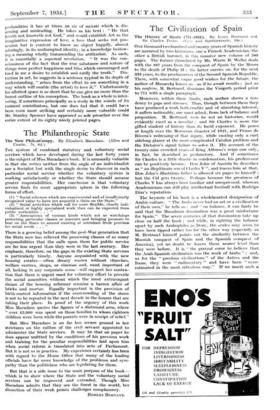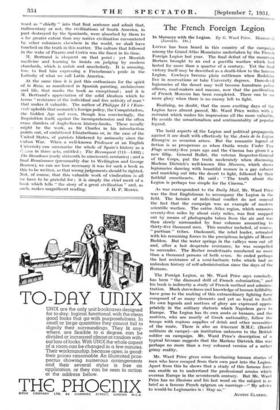The Civilization of Spain
ONE thousandtwo hundred and twenty years of Spanish history are narrated by two historians, one a French Academician, the other a British baronet, in this massive new volume of 580 pages. The former (translated by Mr. Warre B. Wells) deals with the 887 years from the conquest of Spain by the Moors to the death of Philip II; the latter carries on, for the next 333 years, to the proclamation of the Second Spanish Republic. There, with somewhat vague good wishes for the future, the author of Monarchy leaves us—as if to await results ; just as his confrere, M. Bertrand, dismisses the Visigoth period prior to 711 with a single paragraph.
Moreover, within these limits, each author shows a ten- dency to gaps and stresses. Thus, though between them they have produced a work both erudite and of absorbing interest, it suffers noticeably, one must admit, from lack of balance and proportion. M. Bertrand. were he not an historian, would evidently excel as a novelist ; and Sir Charles is more the gifted student of history than its lucid exponent. He pores at length over the Moroccan disaster of 1921, and Primo de Rivera's redressing of that injury, while casting only a curt sidelong glance at the more complicated Catalan problem and the Dictator's signal failure to solve it. His account of the twenty-nine crowded years of King Alfonso's reign can only, in fact, be described as perfunctory. And if sometimes Sir Charles is a little drastic in condensation, his predecessor can be positively laconic. Don John of Austria he describes as " an illegitimate son of Charles V", and leaves him at that. Don John's illustrious father is allowed six pages to himself: but the Cid gets twenty. Perhaps because the greatness of Charles V has always been familiar and unequivocal, whereas Academicians can still play intellectual football with Rodrigo Diaz's reputation.
The keynote of his book is a wholehearted denigration of Arabic culture. "The Arabs never had an art or a civilization of their own," he tells us ; and "on balance, it can fairly be said that the Musultnan domination was a great misfortune for Spain." The seven centuries of that domination take up close on half the book ; and while, in righting the balance upset by such Arabophiles as Dozy, the scales may seem to have been tipped rather too far the other way (especially as M. Bertrand himself points out the similarity between the Moorish conquest of Spain and the Spanish conquest of America), yet no doubt he leaves them nearer level than they were before. It is " the gravest error to believe that the Arab-Spanish civilization was the work of Arabs " ; and, as for the "precious civilizations" of the Aztecs and the Incas, they were " rudimentary " and have been "over- estimated in the most ridiculous way." If we insert such a
word as " chiefly " into that first sentence and admit that, rudimentary or not, the civilizations of South America, in part destroyed by the Spaniards, were absorbed by them to a far greater extent than any native civilization encountered by other colonizers elsewhere in the world, we shall have touched on the truth in this matter. The culture that followed in the wake of Pizarro and Cones was the finest in its time.
M. Bertrand is eloquent on that point ; yet Moorish medicine and learning he insists on judging by modern standards, which is unfair and unscholarly. It is amusing, too, to find him expressing a Frenchman's pride in the Latinity of what we call Latin America.
At the same time it is just this enthusiasm for the spirit of la Raza, as manifested in Spanish painting, architecture and life, that marks the book as exceptional ; and it is M. Bertrand's appreciation of the solid idealism which he terms "resistance of the individual and free activity of man', that makes it valuable. The author of Philippe 1.1 C l'Esco- rink upholds that monarch's foreign policy, the Conquistadors, the Golden Age and even, though less convincingly, the Inquisition itself, against the incomprehension and the often crass slanders of Anglo-Saxon history-books. These usually might be the work, as Sir Charles in his introduction points out, of embittered Elizabethans or, in the case of the United States, of patriots blinkered by animosity since the Cuban War. When a well-known Professor at an English University can summarize the whole of Spain's history as a
ma in three acts, entitled : The Reconquest (711-1492) ; The Decadence (early sixteenth to nineteenth centuries) ; and a final Renaissance (presumably due to Wellington and George Borrow), we can see how necessary it was for such a book as this to be wr:tten, so that wrong judgements should be righted. Not, of course, that this valuable work of vindication is all we have to be grateful for ; it is simply the chief merit of a book which tells "the story of a great civilization" and, as







































 Previous page
Previous page